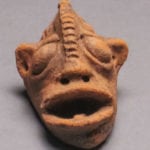 Crime
Crime  Crime
Crime  Animals
Animals The Animal Kingdom’s 10 Greatest Dance Moves
 Movies and TV
Movies and TV 10 Box Office Bombs That We Should Have Predicted in 2025
 History
History 10 Extreme Laws That Tried to Engineer Society
 History
History 10 “Modern” Problems with Surprising Historical Analogs
 Health
Health 10 Everyday Activities That Secretly Alter Consciousness
 History
History Top 10 Historical Disasters Caused by Someone Calling in Sick
 Animals
Animals 10 New Shark Secrets That Recently Dropped
 Movies and TV
Movies and TV 10 Forgotten Realities of Early Live Television Broadcasts
 Technology
Technology 10 Stopgap Technologies That Became Industry Standards
 Crime
Crime 10 Dark Details of the “Bodies in the Barrels” Murders
 Animals
Animals The Animal Kingdom’s 10 Greatest Dance Moves
 Movies and TV
Movies and TV 10 Box Office Bombs That We Should Have Predicted in 2025
Who's Behind Listverse?

Jamie Frater
Head Editor
Jamie founded Listverse due to an insatiable desire to share fascinating, obscure, and bizarre facts. He has been a guest speaker on numerous national radio and television stations and is a five time published author.
More About Us History
History 10 Extreme Laws That Tried to Engineer Society
 History
History 10 “Modern” Problems with Surprising Historical Analogs
 Health
Health 10 Everyday Activities That Secretly Alter Consciousness
 History
History Top 10 Historical Disasters Caused by Someone Calling in Sick
 Animals
Animals 10 New Shark Secrets That Recently Dropped
 Movies and TV
Movies and TV 10 Forgotten Realities of Early Live Television Broadcasts
 Technology
Technology 10 Stopgap Technologies That Became Industry Standards
10 Fascinating Interracial Marriages in History
Attitudes towards Interracial marriage have changed dramatically, in just the last generation. In the United States it was just 43 years ago when interracial marriage was made fully legal in all 50 states. Today, in many countries, interracial marriage is commonplace and most don’t even give it a second thought. However, as we all know, it wasn’t always this way in the past. This list includes individuals who didn’t let the prejudice of society make their decisions in life, and also paved the way for interracial couples in the future.
Note: Interracial marriage can convey a relationship between a Black and an Asian, a White and an Asian, a Hispanic and an Asian, a White and a Hispanic, etc. In this particular list I have included only black and white relationships.
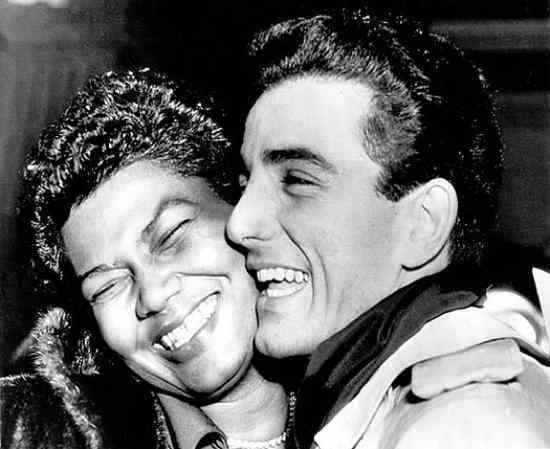
Pearl Mae Bailey was a famous actress and singer and Louie Bellson was a famous jazz drummer, composer and bandleader. Bellson was Duke Ellington’s first white musician and met Bailey after being introduced by a trombone player. After a courtship lasting just four days they were married, in London. It was Bailey’s third marriage and Bellson’s first. Interracial couples were a rarity at the time, and even Bellson’s presence in the Ellington band raised some eyebrows. During some dates in some Southern cities in the United States, Ellington would claim that Bellson was of Haitian background. After their wedding, Louie Bellson spent much of his time as Pearl Bailey’s musical director, writing her arrangements and leading her accompanying bands. The Couple were married for 38 years, until Bailey’s death in 1990, at age 72. Bellson died at age 84, in 2009. The couple adopted a boy, Tony, in the mid-1950s, and girl Dee Dee, in 1960.
Interesting Fact: Bailey served as a United Nations’ Goodwill Ambassador under several Republican Presidential Administrations. Even after the majority of African-Americans moved from The Republican Party to The Democratic Party in 1964, Pearl Bailey remained with The Republican Party because The Republican Party was where she and Louis Bellson found the greatest acceptance for their interracial marriage.
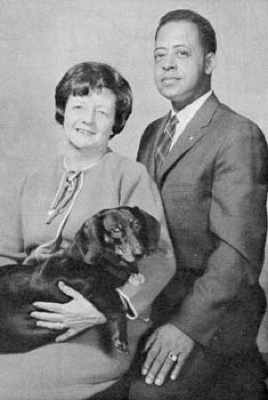
Betty and Barney Hill were from Portsmouth, New Hampshire. Barney worked for the post office and Betty was a social worker. The Hills were also members of the National Association for the Advancement of Colored People (NAACP) and community leaders. On the night of September19th, 1961, Betty and Barney Hill were heading back from a vacation in Southern Canada to their home in New England. They claimed to have observed a bright light in the sky that appeared to be following them. They arrived home at about 3 am and realized (later, when it was pointed out to them) that they had lost about 2 hours of time. Two weeks later Betty began having nightmares. In her nightmares, she described being taken aboard an alien spacecraft and then having medical experiments performed on her. Betty and Barney then decided to undergo hypnosis. In separate sessions, they described some similar experiences of being taken on board an alien spacecraft. Betty said she was shown a star map which she was able to memorize and reproduce later, which some believe is showing Zeta Reticuli as the aliens’ home. Under Barneys hypnotic session he said a cup-like device was placed over his genitals and thought that a sperm sample was taken. He also said he heard them speaking in a mumbling language that he did not understand. The UFO incident was distracting and embarrassing for Barney Hill. He feared that the tabloid publicity would tarnish his battle for equality and dignity. The Hills eventually went back to their regular lives but were always willing to discuss the UFO encounter with friends and UFO researchers. The release of the book “Interrupted Journey” in the mid-1960s, and a movie called The UFO Incident, starring James Earl Jones and Estelle Parsons turned Betty and Barney Hill into the world’s most famous UFO “abductees.”
Interesting Fact: Some psychiatrists suggested later that the supposed abduction was a hallucination brought on by the stress of being an interracial couple in early 60s. Betty discounted this suggestion, saying that her relationship with Barney was happy, and their interracial marriage caused no notable problems with their friends or family. Barney died of a cerebral hemorrhage in 1969, and Betty died of cancer in 2004. Many of Betty Hill’s notes, tapes and other items have been placed in a permanent collection at the library of the University of New Hampshire, her alma mater.
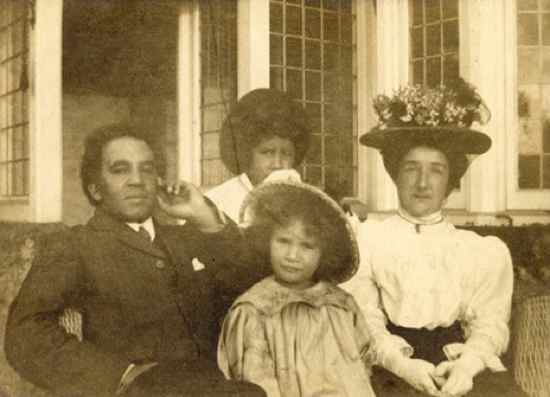
At the turn of the twentieth century, Samuel Coleridge-Taylor was one of Britain’s most outstanding and celebrated composers. He was born to a white mother and black father and was raised in the London suburb of Croydon. At the age of just 23 he produced his most famous work; a musical called Hiawatha’s Wedding Feast. Some describe it as one of the most remarkable events in English musical history. Coleridge-Taylor married Jessie Walmisley, in 1899. She was a pianist and a classmate of Samuel’s in high school. Jessie’s family had been vehemently opposed to the marriage and had done all in its power to prevent it. On the day before the wedding, Mrs. Walmisley invited Samuel to the family home where she and her husband shook his hand in a formal gesture of acceptance. Coleridge-Taylor and his family were targets of abuse from groups of local youths who would repeatedly shower him with insulting comments about the color of his skin. His daughter later recalled “when he saw them approaching along the street he held my hand more tightly, gripping it until it almost hurt.”On September 1, 1912, Samuel Coleridge-Taylor died of pneumonia complicated by exhaustion from overwork. He was just 37 years old. Hundreds turned out for his funeral and a memorial concert which was held to raise money for his widow and his two children, Hiawatha and Gwendoline, who would both go on to have musical careers.
Interesting Fact: It emerged that the publishers of Hiawatha’s Wedding Feast had paid Coleridge-Taylor just 15 guineas (£15.75) for the composition, which earned the company a fortune. Their refusal to grant the widow a fair royalty resulted in the formation of the Performing Rights Society, which has exacted fair dues for composers in Britain ever since.
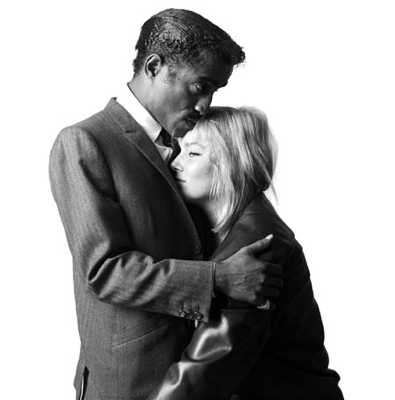
When Sammy Davis Jr. married Swedish-born actress May Britt in 1960, interracial marriages were forbidden by law in 31 US states. Earlier that year the Democratic Convention took place in Los Angeles where John F. Kennedy would be elected as the Democrats’ presidential nominee. When the introductions of Hollywood celebrities were being announced, Davis was booed by many of the white Southern delegates because he was engaged to a white woman. A headline over a New York Times story the next day read, “Delegates Boo Negro.” JFK’s father, Joseph Kennedy, was worried that Davis’ marriage to a white woman on the eve of the November election might cost his son votes, so Davis reluctantly postponed the wedding until after the election. At the wedding Frank Sinatra was the best man along with many other stars, including Peter Lawford, Dean Martin, Janet Leigh, Shirley MacLaine, Milton Berle and Edward G. Robinson. During their marriage the couple received hate mail and were targets of nasty jokes and vicious slurs. Because Davis performed almost continuously he spent very little time with his wife. They divorced in 1968, after Davis admitted to having had an affair with singer Lola Falana. Davis and Britt had a daughter and also adopted two sons.
Interesting Fact: Before Davis met Britt, he had a relationship with actress Kim Novak. A contract by the mob was allegedly put out on Davis’s life. Frank Sinatra intervened but Davis still feared for his life and married a black showgirl. The marriage only lasted a few months and was later annulled. Some consider Novak the love of Davis’ life. Before he died of throat cancer, Davis’s third wife, Altovise, allowed Novak to visit. She and Sammy spent hours talking and reminiscing just weeks before he died, in 1990.
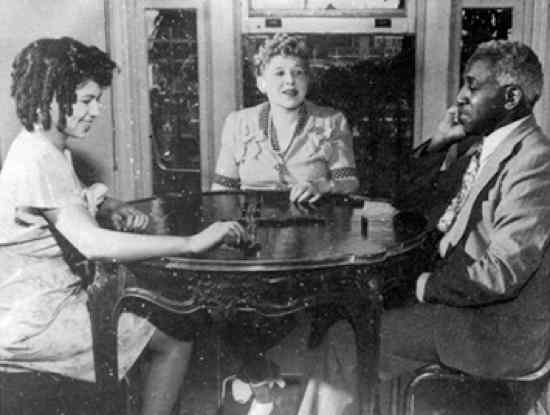
George S. Schuyler was a journalist, satirist, author and editor. During the mid 1920s, Schuyler was published in The Nation, and other left wing publications. Josephine Cogdell was an actress, model and dancer and came from a wealthy, former slave-owning family. She was intrigued by new ideas and radical politics and began corresponding with Schuyler, who was a brilliant and controversial journalist at the time. When she traveled to New York to meet him they would both write later that it was love at first sight. When they were married she proclaimed herself “colored.” on the marriage certificate because of the dangers of crossing racial lines. The couple believed that intermarriage could “invigorate” both and help solve many of the United States’ social problems. George and Josephine had one child named Philippa. Their daughter became a noted child prodigy. By the time she was four she was composing classical music for piano. When she reached adolescence, she was performing in the US and overseas. During the late 1940s, and the McCarthy Era, George Schuyler moved sharply to the political right. He believed that the American black could only succeed by working in cooperation with whites, within the democratic system, toward mutual economic gain. He started contributing to the American Opinion, the journal of the John Birch Society and, in 1947, he published The Communist Conspiracy against the Negroes. Schuyler continued his career as a journalist until 1966, when he published his autobiography, Black and Conservative. The couple remained married until George’s death in 1977.
Interesting Fact: In 1967, their daughter, Philippa, had begun a career as a news journalist and traveled to Vietnam as a war correspondent. While attempting to rescue schoolchildren from a war zone, the helicopter crashed into the sea. She initially survived the crash but her inability to swim caused her to drown. She died at the age of 35. Film rights to her biography have been sold and it has been reported that she is to become the subject of a movie starring Alicia Keys. The above photo shows Phillipa, Josephine, and George Schuyler playing dominoes, around 1945.
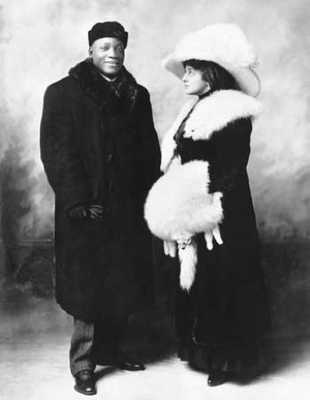
Jack Johnson was an American boxer and the first African American world heavyweight boxing champion, a title he held from 1908 to 1915. In addition to being a rich and famous athlete, Jack Johnson also performed for theatre companies between fights, singing, dancing and acting. He also led a very fascinating life, to say the least. Jack Johnson was married three times. All of his wives were white, which caused considerable controversy at the time. In January 1911, Johnson married Brooklyn socialite and divorcee Etta Terry Duryea, after meeting her at a car race. Their romantic relationship was often very turbulent. Sources also indicate that Johnson was physically abusive towards her and was often unfaithful. Etta suffered from severe depression, evidenced by her reportedly wild mood swings. In 1912, after just 8 months of marriage, Etta committed suicide by shooting herself in the head. Shortly afterwards he met his second wife, Lucille Cameron, who was an 18 year old prostitute. Less than three months after Duryea’s suicide Johnson and Cameron were married, an act that outraged the public. In 1913, Johnson was convicted for transporting women across state lines for immoral purposes, which was part of the Mann Act. For the next seven years, the couple lived in exile in Europe, South America and Mexico. Johnson finally surrendered to the US authorities in 1920, and ended up serving eight months in federal prison. Four years later, Lucille filed for divorce on the uncontested charge of infidelity. In1925, Johnson married Irene Pineau after meeting her at a race track. Johnson would later call her his true love. She remained married to Johnson for the rest of his life. In 1946, Johnson was driving on Highway 1 near Raleigh, North Carolina, when he lost control of his car, which hit a light pole and overturned. He died three hours later.
Interesting Fact: At Johnson’s funeral, Johnson’s third wife Irene Pineau was asked by a reporter what she had loved about her husband. “I loved him because of his courage, he faced the world unafraid. There wasn’t anybody or anything he feared.” The photo above shows Johnson with his first wife, Etta Terry Duryea. Jack Johnson had no children.
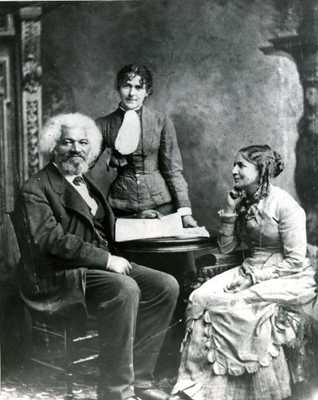
Frederick Douglass was an American writer, social reformer and statesman. He was born a slave in the early 1800s, the son of a female slave and her white owner. After he escaped from slavery in 1838, he married a free African American woman Anna Murray, and had 5 children. After Anna died in 1882, he met Helen Pitts, a white abolitionist and suffragist. Against the wishes of Douglas’s children and her family, they married. The marriage was the subject of scorn by both white and black Americans, but the couple was firm in their convictions. Douglass’s marriage was an affirmation of his personal belief in American unity, and his desire for a true melting pot of cultures within the United States. Douglas laughingly commented, “This proves I am impartial. My first wife was the color of my mother and the second, the color of my father.” Helen Pitts said “Love came to me, and I was not afraid to marry the man I loved because of his color,” The couple were married for eleven years, until his sudden death from a heart attack, in 1895. Douglass was also an advocate of equal rights for women. On the day he died he gave a speech on the topic of female equality and was a believer in granting women the right to vote. Helen is the one seated in the photo above. The woman standing is her sister Eva Pitts.
Interesting Fact: During Fredrick Douglass’s first marriage he had a 26 year affair with German feminist Ottilie Assing. In 1884, when she read in the newspapers that Douglass was to marry Helen Pitts, who was 20 years-younger, she committed suicide in a public park in Paris. The letters Douglass wrote to her were burned, and she left all her money to Douglass.
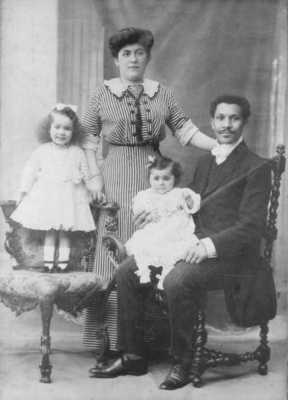
Joseph Philippe Lemercier Laroche was born in Cap Haitien, Haiti, in 1886. At the age of 15, he left Haiti and travelled to Beauvais, France, to study engineering in high school. While visiting nearby Villejuif, Joseph met his future wife, Juliette. After Joseph received his degree, they were married. Their daughter Simonne was born in1909, and a second daughter, Louise was born prematurely in 1910, and suffered medical problems. Because of racial discrimination it prevented Joseph from obtaining a high-paying job in France. The family needed more money to pay for their youngest daughters medical bills so Joseph planned to return to Haiti in 1913, to find a better-paying engineering job. However, in March of 1912 Juliette discovered that she was pregnant, so the family decided to leave for Haiti before her pregnancy became too far advanced. For a welcome present Joseph’s mother in Haiti bought them steamship tickets on the La France, but the line’s strict policy regarding children caused them to transfer their booking to the Titanic’s second class. Racism towards the couple because of their interracial marriage was rampant aboard the ship, especially among the crew members. After the Titanic struck an iceberg historians agree that Laroche was calm and heroic. As the ship sank, Joseph stuffed his coat packets with money and jewelry and took his pregnant wife and children up to the boat deck and managed to get them into the lifeboat. He wrapped the coat around his wife, and his last words were: “Here, take this, you are going to need it. I’ll get another boat. God be with you. I’ll see you in New York.” Joseph Laroche died in the sinking and was the only passenger of black descent (besides his daughters) on the Titanic. His body was never found.
Interesting fact: When Juliette returned to Paris with her daughters she gave birth to a son, Joseph Lemercier Laroche. The White Star Line, the company that owned the Titanic, was later forced to issue a public apology for the derogatory statements made by the crew. When Louise Laroche died on January 28, 1998, at the age of 87 it left only seven remaining survivors of the Titanic.
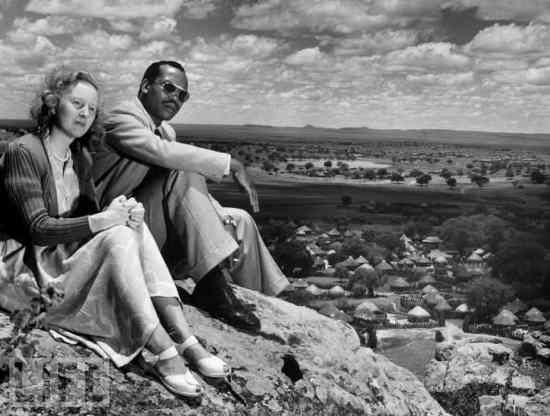
Seretse Khama was born in 1921, and is the son of the Chief of the Bangwato Tribe and ruler of the Bechuanaland (a protectorate by Great Britain) later known as Botswana. When his father died in 1925, Seretse’s uncle, assumed the role as Seretse’s guardian and Acting Chief. His uncle sent Seretse to England so he could continue his education. It was while he was in London, when studying for his bar examinations, that he met Ruth Williams. They shared their enthusiasm for jazz and eventually romance ensued and they were married a year later, in 1948. The interracial marriage sparked a furor among both the apartheid government of South Africa and the tribal elders. Seretse was at first banned from the chieftainship and the territory for breaking tribal custom, but was later re-affirmed and eventually became Chief. Because of the apartheid system in South Africa, the country could not afford to have an interracial couple ruling just across their border, so pressure was put on to have Seretse removed from his chieftainship. In 1951, the British government launched a parliamentary enquiry. They somehow proved that Seretse was unfit to be chief, and exiled Seretse and his wife Ruth from Bechuanaland. In 1956, Ruth and Seretse were allowed to return to Bechuanaland as private citizens, after he had renounced the tribal throne. In 1961, Khama founded the Nationalist Bechuanaland Democratic Party and became Prime Minister of Bechuanaland. In 1966, Botswana gained its independence and Seretse Khama became the country’s first President. Ruth (Lady Khama) was a very influential and politically active first lady during her husband’s tenure as president, from 1966 until his death in 1980. In 1966, Queen Elizabeth appointed Khama Knight Commander of the Most Excellent Order of the British Empire.
Interesting Fact: Botswana was among the world’s poorest countries but during Seretse Khama’s tenure as president, Botswana had the fastest growing economy in the world. Khama instituted strong measures against corruption and reinvested money into infrastructure, health and education. In 2009, Seretse and Ruth’s fist son, Ian, won a landslide victory and became the fourth President of Botswana. Their younger son, Tshekedi , was elected as a parliamentarian.
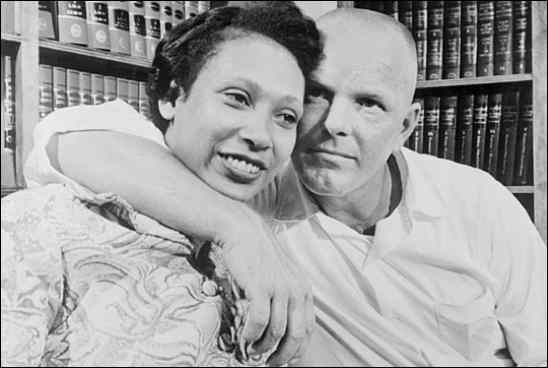
This is at the number one spot because this couple’s marriage overturned state laws in the United States that prohibited interracial marriages. Richard and Mildred were from Virginia and met when he was 17 years old and she was 11. As they grew older, their friendship blossomed into romance. When Mildred was 18 she became pregnant so the couple decided to travel to Washington, D.C. to be married. Five weeks after their wedding, they were awakened at 2 a.m. by police and arrested for being married to one another. In 1959, they pleaded guilty to the charge against them and were sentenced to one year in jail. The sentence was suspended on the condition that the Lovings leave Virginia and not return for 25 years. The Lovings moved to Washington, D.C., and faced housing discrimination, compounded by deep unhappiness about not living close to their families. Mildred wrote a letter to Attorney General, Robert F. Kennedy. Kennedy then forwarded the letter to the American Civil Liberties Union. After many setbacks throughout a nine-year period, their case was heard before the U.S. Supreme Court. In 1967, The Supreme Court decided unanimously in their favor. Richard later said “For the first time, I could put my arm around Mildred and publicly call her my wife.” In 1975, Richard Loving died at age 41, when a drunken driver struck the couple’s car. Mildred Loving lost her right eye in the same accident. Mildred died of pneumonia in 2008, at the age of 68. The couple had three children, eight grandchildren and eleven great-grandchildren.
Interesting Fact: An annual celebration called Loving Day is held on June 12, the anniversary of the 1967 United States Supreme Court decision. Many organizations sponsor annual parties across the country, with Lovingday.org providing courtroom history of anti-miscegenation laws, as well as offering testimonials and resources for interracial couples.
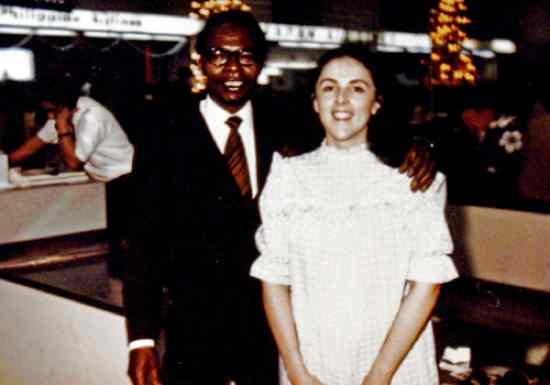
I wasn’t going to include this couple in the list because their relationship was so short, but I know there would be many comments asking about them so I decided to include it as a bonus.
In 1960, after Ann Dunham graduated from high school in Mercer Island, Washington, her family moved to Honolulu. Dunham then enrolled at the University of Hawaii. Obama Sr. was 23 years old and had come to Hawaii to pursue his education, and was the university’s first African foreign student, leaving behind a pregnant wife and infant son in Kenya. Dunham met Obama Sr. at the University while attending a Russian language class. When Dunham became pregnant they were married on the Hawaiian island of Maui. Obama Sr.’s wife in Kenya later said she had granted her consent for him to marry a second wife, in keeping with their countries customs. On August 4, 1961, at the age of 18, Dunham gave birth to her first child, Barack Obama II. Dunham took one month old Barack to Washington State where she took classes at the University of Washington from September 1961 to June 1962. Barack Sr. continued his studies in Hawaii until he graduated in 1962, and then left for Cambridge, Massachusetts, where he would begin graduate study at Harvard. Dunham returned to Honolulu to resume her education with her parents helping to raise Barack. Dunham then filed for a divorce in 1964, which was uncontested. In 1971, Obama Sr. came to Hawaii to visit his 10 year old son, Barack. This would be the last time he would see him. Obama Sr.’s life fell into drinking and poverty back in Kenya. After a terrible car accident he lost both legs and subsequently lost his job. In 1982, at the age of 46, he was killed in another car accident in Nairobi. Obama Sr. had 7 children. In 1992, Ann, who was remarried to Lolo Soetoro, finally finished her doctoral dissertation and received her Ph.D. in anthropology. Two years later she complained of stomach pains. Months later, she was diagnosed with ovarian and uterine cancer. She died on November 7, 1995, at the age of 52. Ann Dunham had 2 children, Barack and a daughter, Maya, with Lolo Soetoro.
Interesting Fact: Following Ann Dunham’s memorial service at the University of Hawaii, Obama and his half sister Maya spread their mother’s ashes in the Pacific Ocean at Lanai Lookout on the south side of Oahu. Obama scattered the ashes of his grandmother (Madelyn Dunham) who died November 2, 2008, in the same spot weeks after his election to the presidency.
